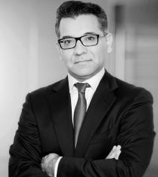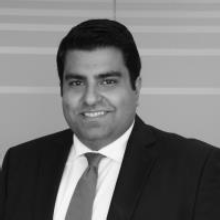By Shahram Safai, Silvia Pretorius, Emad Maghsoudi and Deniz Ghazal
|
The Authors
Shahram Safai Shahram is a partner at Afridi & Angell’s Dubai office. His practice consists of advising on private equity/venture capital, corporate, and real estate law. He heads the firm’s venture capital and real estate teams and has been highly sought after by boards and shareholders for strategic legal advice. Shahram is qualified as a solicitor in England and Wales and is a member of the California State Bar. He is also a registered professional engineer.
Silvia Pretorius Silvia Pretorius is a senior associate at Afridi & Angell’s Abu Dhabi office. She is involved in the firm’s corporate and commercial, banking, real estate, and project finance practices. Silvia holds an LLB and BA from the University of Natal, South Africa. She is a member of Side Bar (Natal and Transvaal Provincial Divisions), South Africa.
Emad Maghsoudi Emad advises clients on general corporate and commercial transactions, as well as on mergers and acquisitions. Prior to joining Afridi & Angell, Emad served as the legal counsel for a mobile telecommunications infrastructure provider in the DIFC and assisted with their acquisition of Kuwait’s telecom tower portfolio. Emad is a member of the New York State Bar and the District of Columbia Bar.
Deniz Ghazal Deniz is responsible for the delivery of all aspects of legal knowledge management for Afridi & Angell, including the monitoring of legal, regulatory, and market developments in the UAE. She has been a practicing corporate lawyer since 2001 and has experience in the US as well as in Turkey advising on cross-border acquisitions, capital markets transactions, and financing. Deniz is admitted to practice law in the US in New York, California and New Jersey. |
In the lead up to the Expo 2020, the UAE government has taken a number of measures to promote economic diversification, foster growth, and stimulate the region’s innovation environment. The government’s push to develop the private equity, venture capital, and start-up eco-system is a central component of this agenda. In this inBrief we summarize the recent developments implemented in the UAE that enhance the ease of doing business for private equity and venture capital funds as well as start-up companies.
New regime for fund establishment and management
Over the last three years, the UAE Securities and Commodities Authority (SCA) has issued two important laws concerning the regulation of private equity and venture capital funds in the UAE. They are, (1) SCA Board of Directors’ Chairman Decision No. (9/R.M) of 2016 and (2) SCA Administrative Decision No. (3/R.T) of 2017. Some of the key provisions of these laws include:
- establishing local mutual funds and marketing and promoting of foreign funds to investors in the UAE;
- conferring corporate personality on the fund and limitation of investor liability; and
- defining “Venture Capital Fund” as well as the conditions for venture capital funds to
Despite these positive laws, onshore funds tend to be uncommon in the UAE due to foreign ownership restrictions and regulatory requirements imposed by the SCA. Consequently, many private equity and venture capital funds are established in the economic free zones of the Dubai International Financial Centre (DIFC) and Abu Dhabi Global Market (ADGM) (collectively, the Financial Free Zones), which are regulated respectively by the Dubai Financial Services Authority (DFSA) and the Financial Services Regulatory Authority (FSRA) (collectively the Offshore Regulators).
The Financial Free Zones permit fund managers located both within and outside the Financial Free Zones to establish funds within the Financial Free Zones through a range of fund vehicles that include investment companies, investment partnerships, and investment trust structures. The fund managers based in the Financial Free Zones also have the flexibility to establish and manage funds outside the Financial Free Zones. Firms authorised or licensed by the respective Offshore Regulators can also promote and sell both domestic and foreign funds in or from the Financial Free Zones. In addition, the SCA and the Financial Free Zones have recently begun implementing a passporting regime that will allow for the mutual promotion and oversight of domestic funds established in these respective jurisdictions.
Also, the Financial Free Zones have taken several steps to create a favourable regulatory environment for private equity and venture capital funds. For example, they apply a risk-based regulatory approach for their funds regime that includes exempt funds (which are funds available for professional clients) and qualified investor funds, which have less stringent requirements than exempt funds and are specifically targeted at sophisticated investors such as high net worth individuals and family offices. In addition, the FSRA has introduced a risk-proportionate regulatory framework for managers of venture capital funds, which among other things, exempts venture capital fund managers from base capital or expenditure-based capital requirements.
New trends
Several recent legislative developments have also collectively provided more opportunities for funds and regulators have sought to stimulate disruptive industries. For example, each of the DIFC and the ADGM established a FinTech regulatory sandbox to create a progressive regulatory environment for the growth of the FinTech industry in the UAE.
In addition, the new pledge law enables pledgees to perfect their security interest over movable assets. This law will substantially enhance and create certainty in commercial lending. As a result, start-ups lacking immovable property will find it easier to avail bank financing by pledging movable assets such as their receivables, raw materials, or future assets.
Finally, the UAE’s new bankruptcy law introduces a regime that allows for protection and reorganisation of distressed businesses. It offers some protection for issuers of dishonoured cheques for the duration of any preventive composition or restructuring procedure. In addition, the new law provides debtors with the ability to raise new finance during the preventive composition or restructuring process, with court approval. Together, these changes provide entrepreneurs with further confidence to take calculated risks and comfort banks/investors with exposure to such investments.
* * * *
The above positive changes will result in the establishment of new funds and attract more entrepreneurs and investors to the UAE. Ultimately, such policy reforms will cement the UAE’s position as the private equity, venture capital and the start-up hub of the Middle East. ■
* A special thank you to Samarth Vijay (legal intern) who assisted in drafting this inBrief.
| Afridi & Angell
Founded in 1975, Afridi & Angell is a full-service UAE law firm in its fifth decade at the forefront of the legal community. From the beginning, our hallmarks have been a commitment to quality, unsurpassed knowledge of the law and the legal environment, and crafting of innovative business solutions. Licensed in the three largest Emirates of Abu Dhabi, Dubai and Sharjah as well as the Dubai International Financial Centre, our practice areas include banking and finance; corporate and commercial law; arbitration and litigation; construction; real estate; infrastructure projects; energy; project finance; maritime (wet and dry); and employment. We advise local, regional and global clients ranging in size and sophistication from start-ups, sole proprietorships, family-owned businesses, entrepreneurs and investors to some of the world’s largest public and private companies, governments and quasi-government institutions. We attract and retain clients with our dedication to practical guidance focused on their business needs supported by decades of experience here in our home jurisdiction, the UAE. Afridi & Angell is the exclusive member firm in the UAE of top legal networks and associations, most notably Lex Mundi, the world’s leading network of independent law firms, and World Services Group. |
| Afridi & Angell’s inBrief provides a brief overview and commentary on recent legal announcements and developments. Comments and opinions contained herein are general information only. They should not be regarded or relied upon as legal advice.
© 2019, Afridi & Angell |






